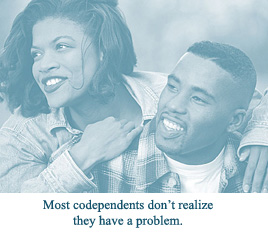Codependency“Codependency” is used to describe the person who becomes the “caretaker” of an addicted or troubled individual. The individual can be addicted to alcohol, drugs, or gambling. Or, he or she can be troubled by a physical or emotional illness. Codependents can be this individual’s partner, lover, child, parent, brother, sister, co-worker, or friend. Codependents do these things:
|
 |
Typical Roles That Codependents Play
|
|
Rescuer – saves the person
from unpleasant situations, i.e., putting an alcoholic to bed after
he/she passes out |
|
|
Caretaker – takes care of all
household and financial chores which hold the family together |
|
|
Joiner – rationalizes that the
person’s behavior is normal by simply allowing it to take place or
by taking part in the same behavior as the addicted or troubled
individual |
|
|
Hero – becomes the “super
person” to preserve the family image |
|
|
Complainer – blames the person
and makes him or her the scapegoat for all problems |
|
|
Adjuster – withdraws from the family and acts like he/she doesn’t care |
Most codependents do not realize they have a co-dependent problem. They focus more energy on another’s actions and needs than on their own. They think they are actually helping the troubled person, but they are not.
Questions to Ask
|
 |
|
|
|
|
|
You may not be truly codependent, but you should become aware of how your behavior may be enabling an addicted or troubled individual.
Self-Help
Most codependents are not in touch with their co-dependency and may need help to see it. The following self-help tips are general suggestions. For many people, these are not easy to do without the help of a counselor.
|
|
Read books on codependency. You can find these in the library and bookstores. You may find you identify with what you read and gain understanding. |
|
|
Focus on these three C’s:
|
|
|
Don’t lie, make excuses, or cover up for the abuser’s drinking, drug, or other problem. Admit to yourself that this way of living is not normal and that the abuser or troubled person has a problem that needs professional help. |
|
|
Refuse to come to the person’s aid. Every time you bail the abuser out of trouble, you reinforce their helplessness and your hopelessness. |
|
|
If you or your children are being physically, verbally, or sexually abused, do not allow it to continue. Seek the help of shelters for victims of domestic violence. |
|
|
Know that there are many support groups which help codependents. Examples are self- help groups for family and friends of substance abusers, such as Al-Anon, Alateen, and Children of Alcoholics Foundation (COAF). Other self-help and support groups are offered through community health education programs. |
|
|
Continue your normal family routines, i.e., include the drinker when he/she is sober. |
|
|
Focus on your own feelings, desires, and needs. Begin to do what is good for your own well-being. |
|
|
Allow children to express their feelings. Show them how by expressing your own. |
|
|
Set limits on what you will and won’t do. Be firm and stick to these limits. |
|
|
Engage in new experiences and interests. Find diversion from your loved one’s problem. |
|
|
Take responsibility for yourself and others in the family to live a better life whether your loved one recovers or not. |
What You Can Do for a Friend or Relative
Persons who are codependent may not realize they have a problem, deny they have a problem, and/or refuse to get help. If you think someone you know is codependent, the following tips can help you help them:
|
|
Let them know that you are concerned for their well-being and health. |
|
|
Encourage them to seek professional help and/or join a support group. |
